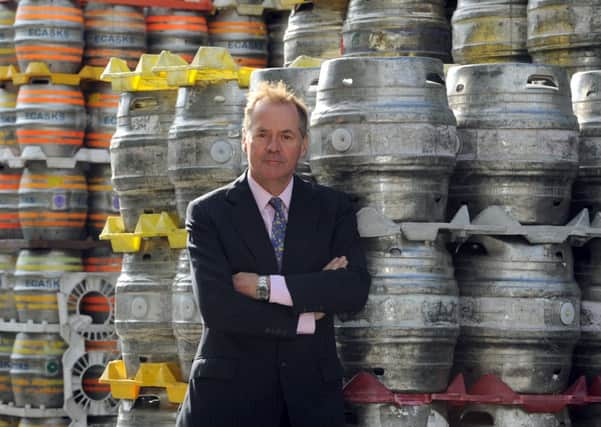Brewers call for reform of tax relief scheme


The so-called progressive beer duty (PBD) scheme, which was introduced 11 years ago, has been heavily criticised by Yorkshire brewers Black Sheep and Timothy Taylor, while the British Beer & Pub Association (BBPA), which represents Britain’s brewers and pubs, has called for a review of the system.
A spokesman for BBPA said that, in principle, it is right that there is a mechanism for encouraging Britain’s micro-brewing sector, describing the scheme as having been “hugely successful” in encouraging innovation.
Advertisement
Hide AdAdvertisement
Hide AdBut he said that since the introduction of PBD, beer duty has risen 61 per cent. “As duty has gone up, the favourable tax treatment that this brings to these brewers, may well now be far greater than was originally intended.
“This can create a distortion between brewers that are under the scheme, and those that are not.”
Charles Dent, managing director of Timothy Taylor, based in Keighley, said that the real problem is that the excise rate is “far to high” for everybody. He continued: “That was increased over the last four years by some 40 per cent and although we celebrated the first reduction in excise this last Budget it was only a two per cent of that 40.
“We need to get that 40 per cent off if we really want to make a difference and go on reducing it because the excise in this country is eight times more than in Germany where progressive beer duty does work and six times more than France.”
Advertisement
Hide AdAdvertisement
Hide AdPBD was introduced for brewers producing under 30,000 hectolitres (hl) a year, with 50 per cent duty relief for under 5,000hl, and a sliding scale from 5,000 to 30,000hl. It was extended in 2004 to increase the upper limit to 60,000hl.
The BBPA spokesman said: “We need to avoid a system that discourages brewers from growing their businesses above the level where they would benefit from this tax relief, and also ensure that medium-sized brewers are not excessively undercut due to this system, stifling their potential for growth.”
Robert Theakston, managing director of Black Sheep Brewery in Masham, said that the smaller brewers use the tax relief to sell their beer at cheaper rates than those not benefiting from the scheme. The brewery last week reported a loss for the first time since its early start-up years.
The Masham-based company, which was established more than 20 years ago, recorded pre-tax losses of around £740,000 in the year to the end of March 2013, compared to a pre-tax profit of £504,000 in 2012, according to Companies House.
Advertisement
Hide AdAdvertisement
Hide AdMr Theakston said: “We bear the scars of a difficult trading environment, where small regional brewers like ourselves not benefiting from the Government’s ‘progressive beer duty’ policy, and not having a pub estate to support the business, are finding it tough.”
The PBD was introduced in 2002 by the Labour government, which at the time said that it would give small breweries “the confidence to invest in their future”.
But Mr Dent claimed the introduction of the scheme was “a political gambit”, which has now created a step. “There’s loads of people sucked into it now and they do depend on it and they can’t get off it, actually they need to level the playing field,” he added.
The BBPA spokesman said the body supports a Government review of the system and how it operates, to ensure “a fair and sustainable PBD system for the long term”.
Advertisement
Hide AdAdvertisement
Hide AdMr Dent said it’s a matter of time before a consolidation of the market place occurs. “Since the introduction of the progressive beer duty the micros have gone from 400 in number to 1,100 or 1,200 (in the UK) and still rising,” he said.
He questioned the logic of the scheme: “Why should small biscuit makers or cake makers or ice cream makers or chair makers not get a special tax relief?
“That’s the way of the world. When you start small you have to be on the same rules as everybody else otherwise you create a step and what’s happening now is there’s a number of brewers I know who are not going above a certain level... it totally restricts proper economic development.”
An HM Treasury spokeswoman said that the Government is “pleased with the continued success of the micro-brewery industry”.
Advertisement
Hide AdAdvertisement
Hide Ad“Changes to the rates of alcohol duty are a matter for the Chancellor at Budget. However, the Government has taken action to support the industry by cutting 1p off the rate of tax on beer, and by scrapping the beer duty escalator.”
The beer duty escalator automatically increased by two per cent above inflation every year.
• THE Society of Independent Brewers, which campaigned for ‘progressive beer duty’ for 20 years, is calling for it to be extended so that larger brewers can be brought within the scheme.
Keith Bott, chairman, said: “This policy, as HM Treasury says, has been hugely successful with a huge increase in demand for local beers, and the number of breweries who supply that demand. The jobs created, in both local breweries and the supply chain, are significant in number and many independent brewers are seizing the opportunity to keep pubs in their communities open with the additional employment that creates.”